Improving Collegiality at FCC's 8th Floor
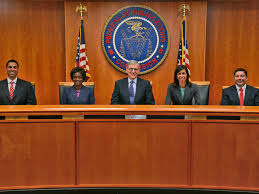
Yesterday's FCC Blog post by a commissioner, "Stop Unfairly Censoring Commissioners", highlights a growing collegiality problem at FCC that is not doubt impacting FCC productivity and effectiveness. As someone who worked nearly 25 years at FCC this is sad. However, it has been building for years and was not caused by one party or one commissioner. While it may be easy to forget the Chairmanship of Kevin Martin, similar problems existed then also. Since Chmn. Martin succeeded Chmn. Powell - the chairman in recent history who created the maximum harmony at FCC - and both were appointed by Bush43, it is clear that no single administration or party has a monopoly on creating such problems.
In the interest of being constructive, I humbly offer some suggestions for FCC leadership to consider for improving harmony at the top for the benefit of all:
- A temporary moratorium by all 8th Floor residents, not just commissioners, on Twitter other than brief factual statements, e.g. "Will be speaking Chicago next week at XYZ conference". The Commission lived without Twitter for several generations and maybe a pause is needed to let all involved focus on how it can be most constructively used.
- A similar pause in use of the FCC Blog while a consensus-based framework is developed for its use.
- Use of closed Commission meetings from time to time to discuss internal processes. The Government in Sunshine Act generally requires open meetings for multiple member agencies BUT there are exceptions. Specifically 5 USC § 552b(c)(2) provides one for meeting that "relate solely to the internal personnel rules and practices of an agency". As far as I can tell, the last time there was an FCC closed meeting on any matter was the one announced below on November 1, 2001:
- The senators on the Senate Committee on Commerce, Science, and Transportation should get together and discuss whether they really want in the long term an FCC that is dominated by former congressional staffers. (While Comm. Clyburn is not literally a former Hill staffer, she is clearly well connected there.) This custom dates from the 1990s in the Clinton Administration as a general "work around" to get commissioners in various regulatory agencies confirmed. While it solved that problem, it has created new ones including the lack of anyone who has had real experience in the regulated industries since James Quello was appointed first in 1974. In particular, no one who has worked in Silicon Valley has ever been nominated. No one has ever tried top meet the payroll of an entrepreneurial firm that was waiting for nonroutine FCC approvals of a new FCC-regulated technology. Hill alumni have many skills, but a near monoculture of them may well be a contributor to the current situation.
- A consensus-based review of the delegations of authority contained in Part 0, Subpart B. Most of these have not been updated in generations. It is clear that some commissioners are upset over actions taken on delegated authority that they are not consulted on. It is also clear that there are many issues, particularly obscure noncontroversial technical issues that are being voted on by the commissioners that, in all due respect, they do not add value to. The requirement for en banc votes either at a meeting, by circulation, or by "consent agenda" slows down resolution of matters that can slow down innovation. This is discussed in greater length in my TPRC paper on FCC productivity in spectrum policy. If the board of General Motors had to see and vote on every design detail of next year's Chevy, it would never be produced. FCC should consider models of other US multimember commissions and also how Ofcom delegates matters to its staff. The commissioner should generally vote on the issues that are important to them and give staff real guidances on what is delegated and more general policies should be developed for dealing with such delegated matters with reasonable checks and balances. This should improve 8th Floor harmony.

Harmony
UPDATE
A 2/26/16 story on this blog post in TRDaily stated:
"In addition, he said senators should consider whether congressional staffers should continue to be confirmed as FCC Commissioners, saying such confirmations have resulted in many people with no experience in the industries the FCC regulates."
Note that this differs in key respect from the actual original post above which states:
"Hill alumni have many skills, but a near monoculture of them may well be a contributor to the current situation."
The issue is not whether former Hill staffers are qualified to be commissioners at FCC, but rather whether this should be the background of most commissioners.
Tragedy of the Commons: An Alternative View


The concept of "the tragedy of the commons" is gaining currency again as the industry debates the regulatory and commercial wisdom of allowing LTE access to the Wi-Fi bands via LAA (licensed assisted access) or LTE-U (unlicensed LTE).
The term is often used as if it refers to a "known" which emerged from the study of land usage: the idea that commonly held resources go to rack and ruin. In fact the opposite is the case: in the disciplines where it has been studied, it is widely viewed as discredited. In history, there is little evidence of a tragedy, and in economics, the academic who challenged the concept won a Nobel prize.
Modern usage stems from a 1968 academic article called "The Tragedy of the Commons" by Garrett Hardin. He argued that open pastures are inevitably overgrazed because adding extra cattle gives a large individual benefit to their owner, whereas the eventual environmental degradation caused by overstocking is shared by all users.
Privatise common land and the problem disappears: overstocking damages the landowner directly, so this incentive to inefficiency disappears. In the 1970s and 1980s, this became a powerful argument for privatisation - particularly in developing economies - and was applied not just to land but also to industries and utilities.
In the spectrum world, the argument claims that congestion will eventually make unlicensed bands unusable because individuals suffer only marginally as the problem intensifies.
Hardin was extending an argument made by the Victorian economist William Forster Lloyd in 1833 and used to justify enclosure of common lands in the UK. Enclosure was the practice of taking land used by the general public and giving or selling it to private landlords. This had been going on since medieval times, but intensified from the 17th century onwards.
So where is the evidence that overgrazing caused by common ownership leads to Lloyd's famously "puny and stunted" cattle? In fact, there isn't much. To paraphrase the historian E.P. Thompson, the problem with the "tragedy" argument is that it assumes commoners have no common sense. Scholars like Neeson have documented how communities held special courts to manage the commons and prevent over-grazing.
Furthermore, who would have the money to buy the additional animals to ruin the grazing for everyone else? The richer farmers who would have the most to gain from enclosing common land! Neeson presents evidence of the well-off being prosecuted for ignoring the rules of the common.
Historically, is the "tragedy of the commons" a myth? This probably overstates the case. Evidence presented by Neeson shows isolated examples of badly managed commons but plenty of examples of good management.
Hardin himself recognised this and retracted his original thesis, conceding: "The title of my 1968 paper should have been 'The Tragedy of the Unmanaged Commons'."

The shared student kitchen: a poorly managed commons
The economist Elinor Ostrom won the Nobel prize in 2009 for her re-examination of this debate, producing more subtle and convincing arguments based on the study of the management of natural local resources in developing countries. For her, it was the involvement of the local community that was the key to success.
What can spectrum policy learn from these debates in history and economics? Put simply, we shouldn't regard "the tragedy of the commons" as an inevitability.
The evidence suggests common usage can be a tragedy if poorly managed or a success if well managed. This ties in with our practical experience: surprisingly little congestion has been found so far in studies of Wi-Fi usage. The international development community would call this an example of Ostrom's law, whereby an allocation of resources that works in practice can work in theory. We should recognise this in the spectrum world too.
© PT Publishing 2016
Comm. O'Reilly's Post on "Defending Capitalism in Communications"
American capitalism, and its role in the communications industry,[1] should be embraced, celebrated, and exported throughout the world. Instead, it is under continuous assault domestically by self-defined progressives and ultra-liberals, who have found sport in using misguided rhetoric and false pretenses to denigrate one of the core tenets of American society. They demonize company executives, decry profits and income, promote class warfare and push policy positions favoring government-provided services over private sector solutions. Beyond being disingenuous and inflammatory, these views completely ignore the extraordinary benefits that the American capitalistic system brings to communications services.
Without proper checks and reassertion of our commitment to free enterprise, the latest anti-capitalism talk risks seeping into Commission proceedings and underlying activities. In fact, signs of it can be seen in multiple Commission proceedings, from municipal broadband advocacy to the harmful net neutrality overreach. The following briefly explores just some of the benefits of capitalism.
There are then 5 sections:
1. Connects Willing Buyer and Seller in Marketplace
2. Minimizes Need for Government Interference
3. Protects Consumers Efficiently and Sufficiently
4. Facilitates Profits and Economic Growth
5. Fosters Entrepreneurialism
Your blogger has posted this comment to Comm. O'Reilly's posting
You did not explicitly mention the issue of technical innovation and FCC, but I think this is consistent with your general view. Despite decades of FCC deregulation enabling "permissionless Innovation" there are technical areas where FCC has not been able to develop such a framework. Some technical innovations still require "Mother, may I .." requests to FCC.
Thus the iPhone was introduced with only fast routine FCC approvals but the issue of ANY use radio technology above 95 GHz is the exact opposite requiring non routine approvals with no particular time schedule. While many criticize FDA New Drug Approval procedures, FCC's procedures for new technology requiring unusual approvals is worse in many ways. At least FDA has nominal schedules for NDAs and tells applicants what is needed in their requests
FCC has had before it a petition for a declaratory ruling from IEEE-USA on the issue of whether technology above 95 GHz should be presumed to be "new technology" in the context of Section 7 of the Communications Act. (Note that since 2003 FCC's radio service rules have ended at 2003 GHz and therefore new rules are needed for any type of licensed or unlicensed transmitter above that frequency.) This petition was filed in July 2013 and in January 2016 it was revealed that 2.5 years after filing it is circulating on the 8th Floor. TRDaily reports that the draft says that Section 7 requests should always be handled on a "case by case" basis. Oddly in the 30+ years since Section 7 was signed into law by President Reagan FCC has not found one "new technology"!
A basic precept of capitalism is that innovators should be able to get new products and services to market in a timely way and let the marketplace decide on their merits. Many people agree that this should be tempered somewhat for products and services that may cause harms. But the endless delays that FCC imposes on new technologies not in areas subject to "permissions innovation" are generally independent of harms to others.
FCC has pledged to deal with corporate mergers on a timely schedule with online status tracking. As far as I am aware there is no statutory mandate for this timely consideration but FCC has chosen to do it as a matter of good public policy. However, Section 7 does give a clear legislative mandate that "It shall be the policy of the United States to encourage the provision of new technologies and services to the public. Any person or party (other than the Commission) who opposes a new technology or service proposed to be permitted under this chapter shall have the burden to demonstrate that such proposal is inconsistent with the public interest." Further Section 7(b) requires " The Commission shall determine whether any new technology or service proposed in a petition or application is in the public interest within one year after such petition or application is filed." This is not a perfectly drafted piece of legislation, but are all other parts of the Communications Act that much clearer?
For 30+ years under leadership of BOTH parties FCC has been trying to dodge these mandates. FCC has never asked Congress to modify or clarify or even remove them.
Is this timeliness needed? Look at the examples given by Mitchell Lazarus, a prominent communications law practitioner specializing in innovative radio technology, in his comments in Docket 09-157 of noncontroversial radio innovations that were delayed for years.
Look at the Petition for Rulemaking filed by Battelle Memorial Institute more than 2 years ago for use of a 105 GHz point-to-point system in a band beyond the FCC's 95 GHz limit but consistent with all US spectrum allocations. While this has been mentioned in both the NOI and NPRM in Docket 14-177 there has been NO action on either implementing the proposal or rejecting it. Meanwhile our foreign competitors are targeting spectrum above 95 GHz for commercial use with industrial R&D support and with proposals adopted at WRC-15 (without US participation) to create new ITU spectrum allocations in 275-450 GHz at WRC-19.
Thus the concepts of capitalism require that new products and services must get a timely market test unless there is a real reason to stop them. While many such products and services are now subject to "permissionless innovation" at FCC, many are not. FCC should implement procedures to deal with them in a timely way or be prepared to give technical leadership to our foreign competitors.
FCC FY2017 Budget Proposal
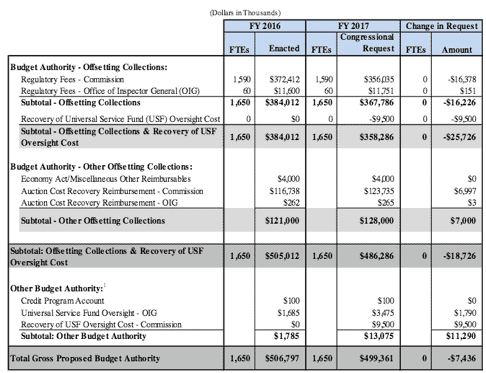
FCC's proposed budget for FY17 has now been made public. The above table shows the bottomline numbers: if adopted, staffing would stay the same at 1650 FTE but spending would decrease by $7M. Hw this would be done in an agency that has been historically underfunded compared to its staff size remains unclear. The historical staffing data shown below almost makes one yearn for the Reagan years!
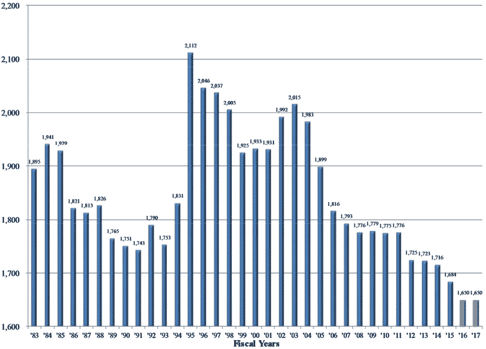
IB, OET, and WTB will see slight staffing increases - presumably at the expense of the EB field staff many of whom are being terminated as a result of "Field Modernization". (EB decreases from 252 FTE in FY15 to 211 FTE in FY17 while IB goes from 110 to 111, OET goes from 87 to 91, and WTB goes from 212 tp 216.) The Inspector General will remain at 60 FTE, the same level as FY16 but a major increase form FY15's level of 38. (You might think that with that many people OIG could do its whole statutory job, but there is no indication that it will change from its "blind eye" policy to the effectiveness of the Commission and its programs other than USF.)
Since FY 2016 spectrum issues are not an explicit FCC goal so one can not see directly how spectrum staffing is changing. FCC's strategic goals are now:
- Promoting Economic Growth and National Leadership
- Protecting Public Interest Goals
- Making Networks Work for Everyone
- Promoting Operational Excellence
Spectrum policy appears to be part of the first goal.
The action part of the budget has $1,250,000 for "Optimization for New Spectrum Opportunities" which is described as:
The optimization team will help us analyze and study options for makng new spectrum available, including through sharing scenarios, to ensure we are maximizing the amount of useful commercial spectrum. They will develop optimal band plans accommodating incumbent uses and demonstrate the value of additional clearing or sharing as necessary.
Note that this proposed sharing is only for "commercial spectrum".
We have been critical of EB's failure to pay relocation costs of employees thus reducing career mobility and preventing exchange of field personnel with headquarters elements of FCC. The budget reveals that in 2015 zero was spent on "Transportation of Things" - a category that includes moving expenses. But in the enacted FY16 budget $100k was included and the FY17 request includes $101k. But since this includes relocation as well as shipping equipment and supplies it is a negligible sum for an nationwide organization even at its new reduced size.
In FY15 EB spent zero on equipment - perhaps you can see why they had a morale problem? The FY16 budget is $225k but the FY17 proposal $2.8M. Can EB actually spend such money well in view of how few central staff they have now for planning field enforcement and the fact they are downsizing the Atlanta area operation that designs and plans equipment?
It is interesting that the budget talks (p. 66) about "the lighting and marking of radio transmitting towers" as an EB responsibility but Field Modernization specifically called for reducing activity here due to "high compliance".
OET's equipment budget goes from $250k to $253k. A look at the price of radio test equipment will show that this does not go very far, basically 1-3 items.
A Visit to a Different Type of Televangelist: TWR Bonaire
My wife and I recently spent 8 days in sunny Bonaire, out 3rd trip their in 3 decades. While there we reconnected with a very different type of televangelist -TWR, formerly Trans World Radio. TWR is now 60 years old, having been started by American evangelicals from a single site in Morocco and is truly a world wide network. I say reconnected because I also stopped by there in 1983 during my first trip to Bonaire because I was fascinated by their antenna system - at the time a 500 kW MF/AM of a type forbidden by FCC for decades as well as a more convention 100 kW shortwave antenna. I discussed the old AM antenna in a recent filing at FCC in Docket 13-249.
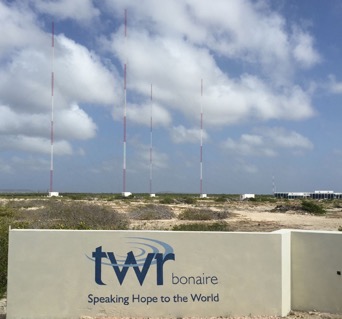
The theology of TWR is not my personal faith, but I was very moved by these dedicated people who have chosen to live in this remote area with their families and home school their children in order to share their faith via radio with others they will probably never meet . TWR separates the broadcasting of its message (in 230 languages!) from its fund raising. Since some of its audiences are in areas where seminaries are either forbidden or impractical, part of its programming deals with developing and educating pastors in such areas.
When I first visited TWR Bonaire decades ago the staff was much bigger because they then had to produce much of the programming on site. However, with advanced telecom much of the programming is produced elsewhere for broadcast in Bonaire and other TWR owned and leased transmitter sites around the world including an FCC-licensed shortwave transmitter in Guam. Today's transmitters and other equipment are also more reliable so less maintenance is needed.TWR also distribute their program content also by Internet especially for areas with high connectivity and even have an iPhone app!.
The Bonaire site is in the process of an upgrade to 450 kW for which they are raising funds:
I want to thank Bonaire Technical Director Dick Veldman and engineer Dave Pedersen for their kind welcome and hospitality. Readers who are hams may recall that Dave,PJ4VHF/N7BHC, set a 2m distance record by successfully receiving a beacon from Cape Verde off the coast of Africa - a distance of nearly 300o miles - last May.
TWR is a 501(c)(3) group that is a member of the Evangelical Council for Financial Accountability. Here is link if you would like to support their work of faith.
SAG Awards and the Future of Spectrum-Based TV
As over-the-air (OTA) "free" TV prepares for its biggest event, the Superbowl, this weekend, it just received bad news last weekend from the annual Screen Actors Guild (SAG) Awards®. As in the Emmys and the Golden Globes, OTA TV is getting very small shares of these awards for programming excellence. As we wrote in September 2013 after the OTA crowd did poorly in the Emmys, maybe there is something basically wrong with the OTA TV business model of NAB's members today? Or perhaps the leaders of the broadcasting industry are spending too much effort on regulatory and legislative games rather than focusing on producing the programming that is attractive to the American public?
When your blogger started working at FCC in 1979 it was clear the biggest power brokers at FCC were NAB, Motorola, and (the then) AT&T. Motorola certainly has nothing near that status or market size today and a likely cause is that it tried repeatedly to use FCC regulation to maintain its market dominance rather than competing on technology and products. Perhaps the NAB membership is guilty of the same violation of the free market system? Will they meet the same fate?
So here are the SAG awards this year for TV. Of the 9 awards one went to PBS and one went to ABC - none to any of the other OTA TV broadcasters. Netflix got 3 awards and HBO got 2.
Outstanding Performance by an Ensemble in a Drama Series
DOWNTON ABBEY (Masterpiece/PBS)
Outstanding Performance by an Ensemble in a Comedy Series
ORANGE IS THE NEW BLACK (Netflix)
Outstanding Performance by a Female Actor in a Drama Series
VIOLA DAVIS / Annalise Keating – “HOW TO GET AWAY WITH MURDER” (ABC)
Outstanding Performance by a Male Actor in a Drama Series
KEVIN SPACEY / Francis Underwood – “HOUSE OF CARDS” (Netflix)
Outstanding Performance by a Male Actor in a Comedy Series
JEFFREY TAMBOR / Maura Pfefferman – “TRANSPARENT” (Amazon)
Outstanding Performance by a Female Actor in a Comedy Series
UZO ADUBA / Suzanne “Crazy Eyes” Warren – “ORANGE IS THE NEW BLACK” (Netflix)
Outstanding Performance by a Female Actor in a Television Movie or Miniseries
QUEEN LATIFAH / Bessie Smith – “BESSIE” (HBO)
Outstanding Performance by a Male Actor in a Television Movie or Miniseries
IDRIS ELBA / DCI John Luther – “LUTHER” (BBC America)
Outstanding Action Performance by a Stunt Ensemble in a Comedy or Drama Series
“GAME OF THRONES” (HBO)
Source: Variety
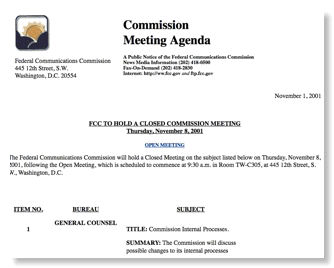
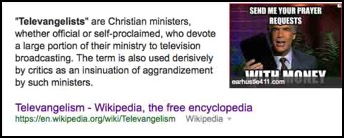


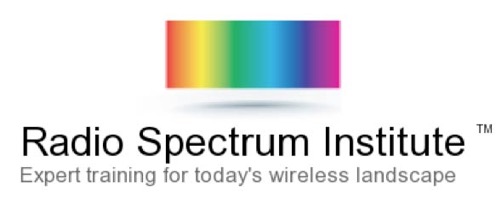


![Validate my RSS feed [Valid RSS]](valid-rss-rogers.png)

